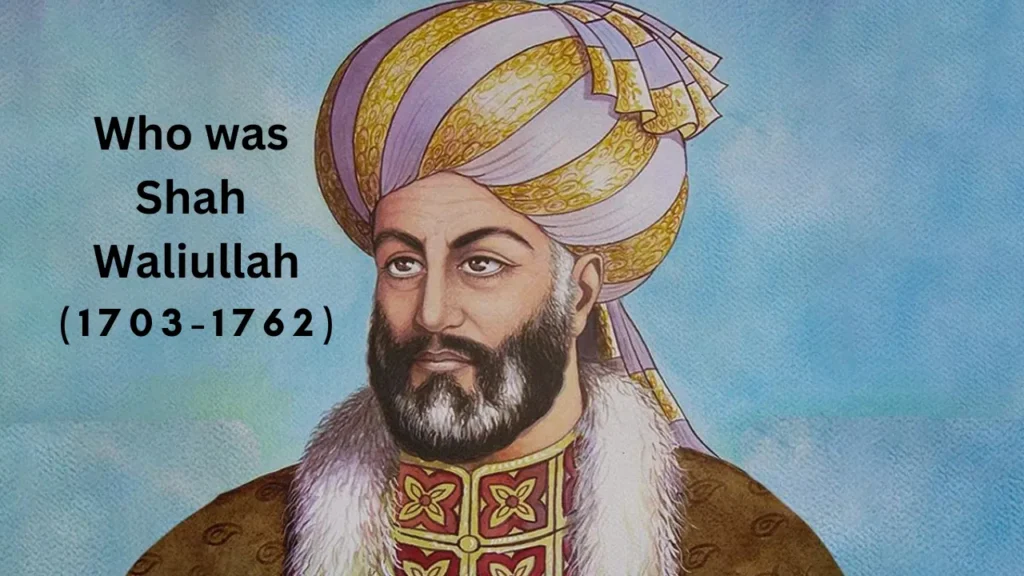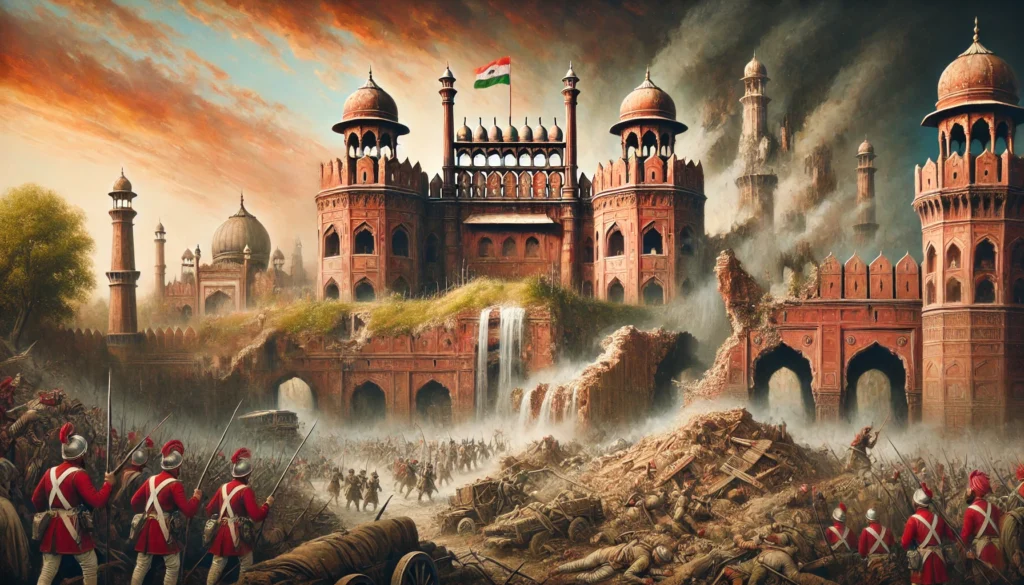Shah Wali Ullah (1703-1762)
1. Biography
1.1 Childhood and Background
• Actual Name: Qutab Ud Din
• Titles: Imam Al Hind, Muhaddas Dehlvi
• Family Lineage: He was the son of Shah Abdul Rahim, who taught in the important Islamic teaching house called Rahimiya Madrasah.
• Birth: Born in 1703 in Delhi, during a time when the Mughal Empire was fighting its most important political and social battles.
1.2 Education and Mentoring
• Early Education: Got primary education in Islamic jurisprudence, theology, and mysticism taught by his father and other known scholars of that time.
• Advanced Studies: Had the opportunity of learning from prominent Islamic scholars, deeply studying Fiqh, or Islamic jurisprudence, and Hadith, or the sayings of Prophet Muhammad, among other Islamic sciences.
________________________________________
2. Conditions of Muslims During His Time
2.1 Fall of the Mughal Empire
• Political Instability: The Mughal Empire was in decline amidst threats from the inner circles and the Marathas, Nadir Shah’s Persian Empire, Ahmed Shah Abdali’s Afghanistan, and an upcoming European power.
• Loss of Central Authority: Such weakening of central authority made regional governors more autonomous and brought forth local powers, thus inflammatory to the fragmentation of the empire.
2.2 Socioeconomic Situation
• Prolonged Economic Decline: Exorbitant taxation, economic exploitation by regional powers, and drain of wealth brought widespread poverty and economic instability amongst Muslims.
Social Disintegration: Traditional social structures and institutions faced disintegration that resulted in the loss of communal cohesion and identity.
2.3 Deviation from Islamic Teachings
• Cultural Assimilation: The increasing influence of Muslims from the non-Islamic cultural and social practices made Islamic religious adherence and associated moral standards less strict.
They include the following: • Neglect of Religious Duties: Inabilities to rightly and ritualistically observe the religious duties of Salah and Zakat, amongst other duties entailed in Islam, totaled an increasing weakness within the Muslims’ spirituality and social bond.
_________________________________________
3. Shah Wali Ullah’s Contributions
An emphasis on Ijtihad rather than Taqlid 3.1
• Ijtihad (Independent Reasoning): Advocated applying reason and interpreting the Islamic texts independently to solve modern problems.
• Taqlid Critique: He criticized the blind adherence with interpretations of the tradition devoid of any consideration of a dynamic socio-political context; to him, this was stultifying progress and adaptability within Muslim society.
3.2 Reinforcement of Fundamental Islamic Practices
Namaz (Prayer), Zakat (Charity), Fasting (Rosa), and Jihad (Struggle): He underscored the following of the five tenets of Islam as imperative for spiritual and social rejuvenation.
• Moral and Ethical Reforms: Advocated ethical behavior, social justice, and welfare of the community as an integral part of Islamic teachings.
3.3 Resolving Shia-Sunni Issues
• Inter- sectarian Harmony: Worked towards resolving theological and political differences between Shia and Sunni Muslims, fostering unity and cooperation within the Muslim community.
• Dialogue and Reconciliation: By taking part in academic discussions and debates, aimed at the rapprochement and mutual understanding of various Islamic sects.
3.4 Development of Muslim Philosophy and Kalam
• Philosophical Inquiry: Contributed to Islamic philosophy through an amalgamation of rationalist approaches with traditional thought within Islam, thereby promoting a balanced and enlightened interpretation of theology.
• Kalam (Islamic Theology): Developed an intellectual structure of Islamic theology by responding to modern challenges through intense theological debate.
3.5 Correspondence with Muslim Rulers
Letters to the Rulers: Wrote several letters to the Muslim rulers guiding them in various respects of governance and administrative policies concerning the implementation of Islamic principles.
• Policy Impact: The letters were meant to guide the rulers towards just and ethical governance by underlining the importance of Shariah, a thing to be considered in administration.
3.6 Persian Translation of Holy Quran
• Accessible Scripture: Translated the Quran into Persian in order to make it more accessible to non-expert quorums without great fluency in Arabic.
• Educational Reform: Facilitated a better understanding and interpretation of the Holy Quran among Persian-speaking Muslims and enhanced religious education and literacy.
3.7 Focus on Fiqh and Hadith
• Legal Scholarship: Concentrating on the strengthening of studying and applying Fiqh and Hadith for an accurate understanding of Islamic Law.
• Hadith Studies: Advocated for the critical examination and authentic transmission of the Hadith, which further cemented their standing in Islamic jurisprudence and everyday applications.
3.8 Adl- Tawazan or the Promotion of Justice and Balance
• Justice in Governance: Advocated for justice as a core principle in governance, ensuring fair treatment and equity within society.
• Social Balance: Stressed the need for balance socially, economically, and politically to avoid unrest and maintain harmony.
_________________________________________
4. Shah Wali Ullah Reforms: Their Implications
4.1 Abolition of Deen-e-Elahi by Jahangir
Suppression of Syncretic Movements: Shah Wali Ullah’s strict opposition against the un-Islamic ways of living and syncretic movements such as Deen-e-Elahi motivated the later Mughal rulers to eradicate these practices.
• Restoration of Islamic Orthodoxy: He brought about a revival of orthodox Islamic teachings and belief, which ran counter to the eclectic religious policies of such rulers as Akbar.
4.2 Preaching in the Royal Court Allowed
• Increased Religious Freedom: The famous advocate of Islamic principles contributed to more tolerance of Islamic preaching and scholarship within the imperial Mughal court.
• Islamic Ethics Integration: It facilitated integrating Islamic ethical standards into governance and administrative practices within the Mughal Empire.
4.3 Advocacy of Islamic Government
• Shariah-Based Governance: They led the Mughal rulers to infuse Shariah into their governance structure and helped in instituting justice, moral conduct, and ethical governance.
• Interventional Reforms: Inspired policies that adhered more closely to Islamic teachings, hence creating a more morally upright and just administration.
4.4 Revitalization and Empowerment of Islamic Faith
• Spiritual Renaissance: He succeeded in giving a spiritual rebirth to the Muslims and rejuvenated their faith in Islam, binding them together in unity.
• Cultural Revival: Favored a cultural renaissance within Muslim communities to bring back the resurgence of Islamic arts, education, and scholarly pursuits.
___________________________________________
5. Literary Contributions of Shah Wali Ullah
Shah Wali Ullah thus wrote a number of works that became landmarks to articulate his reformist ideas and theological positions. These writings, in turn, played a commensal role in spreading his teachings and shaping Islamic thought relating to the Indian subcontinent.
5.1 Fayyuz-ul-Haramin (Ilham)
Spiritual and intellectual awakening of the Muslim, where much emphasis is placed on knowledge and integrity.
• Significance: Encourages Muslims to pursue knowledge and wisdom that shall lead them both intellectually and religiously.
5.2 Izalat-ul-Khufa and Khalafat-ul-Khulafa
Izalat-ul-Khufa: Removal of hidden or subtle un-Islamic practices from amongst the Muslims.
• Khalafat-ul-Khulafa: Dealing with the succession and legitimacy of Islamic leadership, to ensure that rulers will be following Islamic principles.
• Significance: These works strive for the purification of the Muslim society by doing away with un-Islamic practices and ensuring that the rulers are rightfully and ethically in power.
5.3 Al-Insaf fi Bayan Al-Ikhtilaf (Sunni School of Thoughts)
Explains the differences within Sunni Islamic thought and advances unity and understanding among various Sunni factions.
• Significance: It helps to solve some theological disputes inwardly and also presents a more united and harmonious Sunni Muslim community.
5.4 Hajjat Allah al-Balghai (Decline of Civilization)
Critiques the moral and spiritual decline of Muslim society, attributing it to the neglect of Islamic principles and ethical conduct.
• Significance: A call to action directed towards Muslims to revive faith anew and to correct the socio-cultural decay and the moral one in their societies.
__________________________________________
Conclusion
Shah Wali Ullah was a figure who proved transformative in Islamic reformist history within the Indian subcontinent. His inflexibility in sticking to orthodox Islamic ideals, coupled with strategic opposition to syncretic movements and an advocacy for educational and legal reforms, helped him play an important role in rejuvenating Muslim society during a period of significant decline. But by emphasizing Ijtihad rather than Taqlid, resolving the sectarian conflicts, and encouraging studies of Fiqh and Hadith, Shah Wali Ullah provided the intellectual and theological impetus that eventually found expression in the later Islamic reform movements and finally in the demand for a separate Muslim homeland.
His works continue to be studied both for their seminal theological insight and for their contribution to the shaping of Islamic thought in South Asia. Understanding Shah Wali Ullah’s contributions provides valuable insight into historical processes that were fostering religious unity, intellectual renewal, and resistance against un-Islamic influences, which contributed toward the socio-political landscape resulting in the creation of Pakistan.
FAQs:
- Who was Shah Wali Ullah?
- Shah Wali Ullah, also known as Imam Al Hind and Muhaddas Dehlvi, was an influential Islamic scholar and reformer in the Indian subcontinent. He played a key role in reviving Islamic teachings during the declining years of the Mughal Empire.
- What were the main contributions of Shah Wali Ullah?
- His contributions include promoting Ijtihad over Taqlid, reinforcing fundamental Islamic practices, resolving Shia-Sunni conflicts, translating the Quran into Persian, and advocating for justice in governance.
- Why did Shah Wali Ullah translate the Quran into Persian?
- He translated the Quran into Persian to make it accessible to non-Arabic speakers, thereby enhancing religious education and understanding among Persian-speaking Muslims.
- How did Shah Wali Ullah impact Islamic governance?
- His writings and correspondence with Muslim rulers influenced the Mughal rulers to infuse Shariah into governance, promoting justice, moral conduct, and ethical governance.
- What is Ijtihad and why did Shah Wali Ullah emphasize it?
- Ijtihad refers to independent reasoning to interpret Islamic texts. Shah Wali Ullah emphasized Ijtihad to adapt Islamic teachings to modern challenges, in contrast to the rigid adherence to traditional interpretations (Taqlid).




